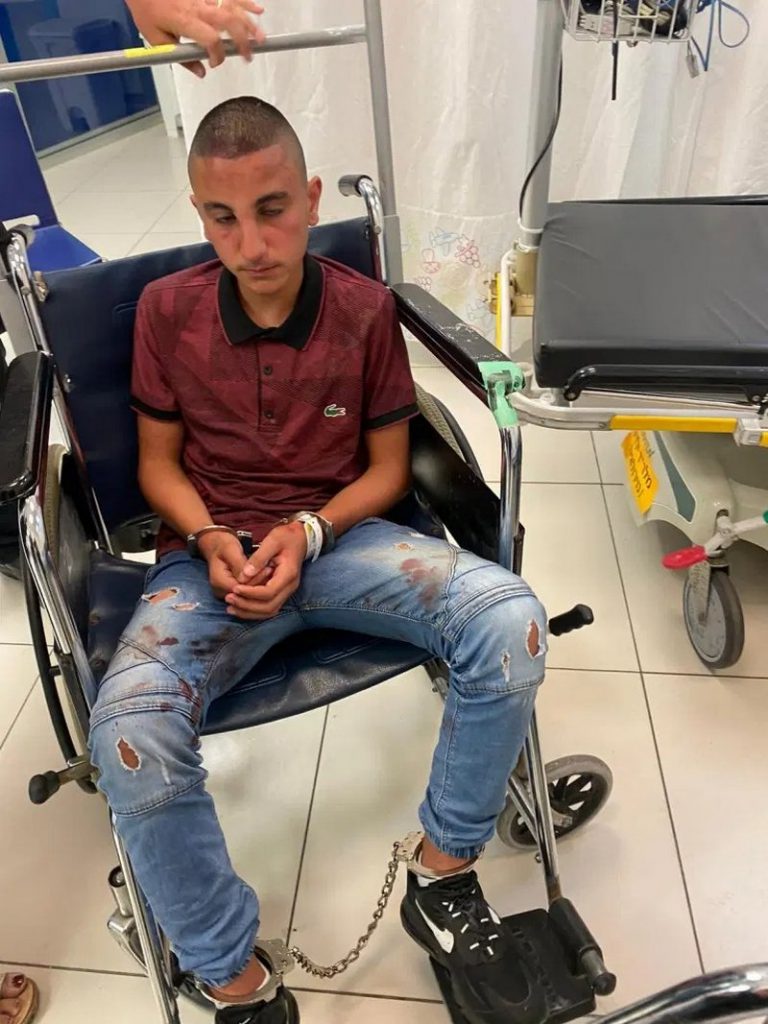Palestinians, legal experts, and activists note a worrying shift in the number of children being arrested as police announce ‘Operation Law and Order’.
Thirteen-year-old Mohammed Saadi was kidnapped, blindfolded, beaten, and threatened with a gun to his head by five men in his hometown of Umm al-Fahem.
It was May 20 and Saadi was among thousands who gathered for a funeral procession held for Mohammed Kiwan, a 17-year-old boy who was shot by Israeli police a week earlier.
At the time, tensions escalated in occupied East Jerusalem over Israel’s planned forced expulsion of Palestinian families from Sheikh Jarrah, attacks on the Al-Aqsa Mosque compound, and Israel’s military assault on Gaza, leading thousands of Palestinian citizens of Israel to protest on a near-daily basis across towns and cities in Israel.
The five men had been near the march for Kiwan in Umm al-Fahem, a town in central Israel that is predominantly inhabited by Palestinians with Israeli citizenship.
They covered their faces with masks and scarves and were dressed like any Palestinian in Israel participating in a sit-in.
Except they were armed and belonged to a part of the Israeli police’s Musta’ribeen unit – an undercover unit made up of Israelis disguised as Palestinians. Its agents usually attend Palestinian protests with the intention of arresting demonstrators.
In the past, they have even killed Palestinians.
When the march ended, at around 8 pm, Saadi and his 15-year-old brother headed home. They approached a roundabout packed with police and army soldiers.
“Out of nowhere, five men stormed out from a silver car nearby and surrounded us. I couldn’t see any of their faces,” Saadi said, days after he was released.
“They assaulted me and were shoving me around and forced me into that same car. Thankfully, my brother managed to run away, so they only got me.”
Inside the car, Saadi was blindfolded and was threatened with death. He did not know where he was going and did not know what he had done wrong.
“They threatened to kill me and constantly used foul language. They insulted my mother, my sister, and my whole family,” he said.
“I asked them to stop, but with every attempt to respond I was met with a beating.”
“They hit my whole body – my head, my arms, my legs. My face was swollen but I would have rather died than be humiliated,” Saadi said.
‘Worried about my family’
Upon arriving at the police station, his arms and feet were cuffed together. Even though his head was bleeding, he did not get any medical attention.
For three hours, while in pain, he was not allowed to contact members of his family or a lawyer.
“I wasn’t scared, I just didn’t want them to punish my parents for something I may have done. I was really worried about my family, more than anything,” Saadi said.
A female police officer who spoke Arabic interrogated him. According to Saadi, she tried to make him confess for things he said he had not done.
“They accused me of assaulting a police officer and throwing rocks – but I didn’t do any of that.”
His father, Shadi Saadi, said he received a call from the station about his son “three hours after his arrest”.
He was released at 3 am, hours after his father arrived at the station with a lawyer.
Agents with the Musta’ribeen unit are usually fluent in Arabic and are familiar with Palestinian culture. They pose as Arabs and carry out operations inside Palestinian communities.
Similarly, in Haifa, 15-year-old Youssef was arrested on May 12 by police from the Musta’ribeen unit, according to his lawyer, Janan Abdu.
Youssef’s lawyer requested not to use his last name, fearing reprisals.

That night, Youssef spent time at a friend’s house where he heard that far-right mobs, mostly made up of Jewish settlers, were attacking Palestinians and their homes.
As he walked home, he saw a group of men with their faces covered, running towards him with sticks and metal rods.
He ran, thinking they were members of the far-right gangs.
According to Abdu, a Haifa-based lawyer with the Public Committee Against Torture in Israel who has volunteered to defend imprisoned Palestinians, the men ran after him, pinned him to the ground, and beat him with the rods “until his head started bleeding”.
“They ended up breaking his nose,” Abdu, who is planning on filing a formal complaint on Youssef’s behalf, said.
She said a large number of children have been singled out by the police’s Musta’ribeen unit in recent weeks.
“These extreme cases are becoming the norm,” she said.
 Alghadeer TV Alghadeer TV
Alghadeer TV Alghadeer TV
